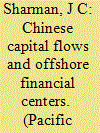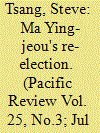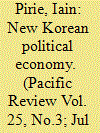|
|
|
Sort Order |
|
|
|
Items / Page
|
|
|
|
|
|
|
| Srl | Item |
| 1 |
ID:
113719


|
|
|
|
|
| Publication |
2012.
|
| Summary/Abstract |
Why is the British Virgin Islands a bigger source of foreign direct investment into China than the USA, the European Union and Japan combined? Why is there 10 times more investment from China in the Caymans Islands than there is in the USA? This paper argues that these flows represent the efforts of Chinese and foreign investors to reduce governance and measurement transaction costs. Investors avail themselves of efficient institutions in offshore centers that are absent locally. These institutional attractions include the ease of raising capital on foreign stock markets, access to reliable courts, and more flexible and sophisticated financial products. Existing explanations of these capital movements, characterizing them as criminal money or tax arbitrage, are insufficient. Evidence is drawn from government statistics, private legal advice and interviews in offshore financial centers.
|
|
|
|
|
|
|
|
|
|
|
|
|
|
|
|
| 2 |
ID:
113720


|
|
|
|
|
| Publication |
2012.
|
| Summary/Abstract |
The Japanese government and business sector have long seen opportunities in making environmental protection a core feature of industrial policy. The 'green' economic diplomacy-effort, which materialized in the late 1980s and largely builds on targeted domestic innovation policies, is now entering new ground. Assessing recent developments in the railway, nuclear power generation, water, and next-generation automobile industries, this paper analyses how and why the Japanese government uses 'green' environmental and energy technology in relations with emerging and developed countries. Public-private partnerships are strengthened, and semi-governmental institutions and individual politicians take up new roles. Adhering to comprehensive security traditions, Japan's policies aim to contribute to the national interest both in terms of economic prosperity and political stability. Primary objectives are the quest for new markets abroad, resources security, and securing cooperative relations with other countries. Adjustment to shifting global power balances, domestic politics, and climate change challenges also play a role, while 'hard' security issues are barely considered.
|
|
|
|
|
|
|
|
|
|
|
|
|
|
|
|
| 3 |
ID:
113722


|
|
|
|
|
| Publication |
2012.
|
| Summary/Abstract |
Ma Ying-jeou's re-election means that there will not be a leadership change in Taiwan, but it still has significant implications. It forces the opposition Democratic Progressive Party (DPP) to work out a succession for itself and confront the political reality that it must now persuade voters in Taiwan that it can manage relations with mainland China effectively in order to win the presidency again. It also requires Ma to define clearly the limits of his mainland policy in order to minimize Beijing's expectations of his second term, as no president of Taiwan can agree to move towards political integration without a popular mandate. On its part, Beijing has taken on board the significance of Taiwan's electoral cycle for managing cross-Strait ties and will put pressure on Ma to move forward over political integration and thus reduce the scope for a future DPP administration to reverse course. This notwithstanding, Beijing's Taiwan policy will ultimately be determined more by the result of the leadership succession in mainland China itself in the autumn of 2012. For USA and East Asia, Ma's re-election is a positive development as it minimizes the risk of a confrontation or a crisis across the Taiwan Strait. But it will not remove the main problems they have with China that are Taiwan related. For USA, arms sales to Taiwan will still be needed and will remain a source of tension with Beijing. For Southeast Asia, stability across the Taiwan Strait implies that Beijing can devote more attention and resources to the South China Sea territorial disputes and that it is likely to behave in a more assertive way.
|
|
|
|
|
|
|
|
|
|
|
|
|
|
|
|
| 4 |
ID:
113718


|
|
|
|
|
| Publication |
2012.
|
| Summary/Abstract |
The Malaysian general elections held on 8 March 2008 proved to be a historic event. For the first time, the political opposition managed to deny the incumbent National Front coalition a two-thirds parliamentary majority. Attempts to explain the opposition coalition's 2008 success have identified new media as a critical factor that turned the tide in the opposition's favour. The purpose of this paper is to better understand the new media factor at the 2008 elections and its immediate aftermath by analysing its role, advantages proffered, and limitations in terms of advancing democratization and greater political openness in Malaysia.
|
|
|
|
|
|
|
|
|
|
|
|
|
|
|
|
| 5 |
ID:
113721


|
|
|
|
|
| Publication |
2012.
|
| Summary/Abstract |
A key theme within the literature on the evolution of the Korean political economy since the 1997/8 crisis has been the extent to which Korea remains a 'developmental state' or has pursued radical neoliberal reform. These debates have not only reflected a concern with understanding the Korean economy but with a wider set of questions relating to the future of capitalist diversity within a globalized economy. By the late 1980s Korea had come to be regarded as a model of successful state-led late capitalist development. Korean modern economic history has insured that questions relating to the extent that it has pursued neoliberal reform have been of keen interest to students of political economy globally. This paper argues that substantive neoliberal reform has taken place in Korea since 1997. The thesis that a new 'developmental state' is in process of consolidating itself is simply wrong. However, the state's reform program interacted with material conditions and political coalitions at the meso level in a complex and uneven manner. In certain critical sectors, such as finance, a neoliberal regulatory regime has been consolidated. In others, such as telecommunications, developmentalist regulatory structures have proven to be highly resilient. In order to fully understand the complexity of the contemporary Korean political economy it is necessary, therefore, to prioritize the importance of meso-level analysis.
|
|
|
|
|
|
|
|
|
|
|
|
|
|
|
|
|
|
|
|
|